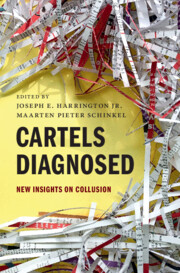Book contents
- Cartels Diagnosed
- Cartels Diagnosed
- Copyright page
- Contents
- Figures
- Tables
- Contributors
- Introduction
- 1 Entry Barriers, Personal Relationships, and Cartel Formation
- 2 “Now You Are Asking for a Real War!”
- 3 Coordinating Fuel Surcharges
- 4 Price Fixing or Fixing Competition?
- 5 The Role of Platforms for Facilitating Anticompetitive Communication
- 6 Collusion with Non-express Communication
- 7 Cartel Instability and Price Wars
- 8 Coordinated Rebate Reductions and Semi-collusion
- 9 Average Bid Auction Format Facilitates Bidding Rings
- 10 The Challenges of Cartelization with Many Products and Ongoing Technological Advancements
- 11 Two Cartels in the Supply Chain
- 12 Is it Collusion or Competition behind Price Parallelism?
- References
Introduction
Published online by Cambridge University Press: 06 December 2024
- Cartels Diagnosed
- Cartels Diagnosed
- Copyright page
- Contents
- Figures
- Tables
- Contributors
- Introduction
- 1 Entry Barriers, Personal Relationships, and Cartel Formation
- 2 “Now You Are Asking for a Real War!”
- 3 Coordinating Fuel Surcharges
- 4 Price Fixing or Fixing Competition?
- 5 The Role of Platforms for Facilitating Anticompetitive Communication
- 6 Collusion with Non-express Communication
- 7 Cartel Instability and Price Wars
- 8 Coordinated Rebate Reductions and Semi-collusion
- 9 Average Bid Auction Format Facilitates Bidding Rings
- 10 The Challenges of Cartelization with Many Products and Ongoing Technological Advancements
- 11 Two Cartels in the Supply Chain
- 12 Is it Collusion or Competition behind Price Parallelism?
- References
Summary
At the start of the 1990s, the world was still a relatively hospitable place for cartels. Many enforcers, such as the US Department of Justice’s Antitrust Division, viewed cartels as largely operating in local or at most domestic markets and that senior executives of major corporations were not so audacious as to operate a global cartel. Turning to the European Commission, it pursued several national business arrangements that affected trade between the member states as part of its European integration objective, but mostly with injunctive relief, and not punishing fines. Some of its countries, such as The Netherlands, did not even have a competition law prohibiting cartels. However, by the end of the 1990s, the DOJ’s Antitrust Division and the European Commission’s Directorate-General for Competition were aggressively prosecuting a slew of international cartels that had been operating for years, while the Netherlands had at long last adopted a competition law and were prosecuting a massive construction cartel with hundreds of members.
- Type
- Chapter
- Information
- Cartels DiagnosedNew Insights on Collusion, pp. 1 - 11Publisher: Cambridge University PressPrint publication year: 2025

